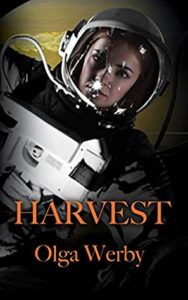
After I made my first pass through my team’s initial 30-book allotment for SPSFC, Harvest was probably the book that I was most excited to get back to. Olga Werby’s entry promised a well thought-out first contact plot with an academic lead, both of which fit firmly within my wheelhouse. So how did it go?
Harvest is one of those novels that I wouldn’t expect to see from a traditional publisher. While first contact is certainly not rare in science fiction, and the genre has a fair few bookish, university-bred leads, Harvest is a theorizing novel as much as it is about going on a mission and handling crises along the way. There is a mission—to explore a mysterious alien beacon discovered on a moon of Saturn—and the lead character joins a team of experts in hopes of ensuring that contact goes as smoothly as possible, but the bulk of the novel consists in a group of subject matter experts trying to puzzle out what they can about the aliens so as to be prepared for the coming contact.
It leads to a story with an unusual pace and style that certainly won’t be to everyone’s taste. But that’s a big part of what these competitions are about. And seeing as how it fits my tastes well enough, I’m not complaining. There’s an ill-conceived one-off prologue that tries to set the stakes with a disaster up front, but after that, our evolutionary socio-historian spends a lot of time lecturing about the preconditions for a spacefaring people. And as further discoveries up the stakes, she responds by connecting with sympathetic experts in other fields and theorizing harder.
As a former academic, it works for me. I enjoy watching smart people puzzle out hard problems, and it feels very true to real life conversations with subject matter experts. I am not a professional scientist, so I can’t say how much of the science is grounded in reality and how much is purely speculative, but Werby successfully sets the stakes, introduces realistic characters, and lets them try to solve them in a way that feels natural. It won’t work for someone looking for a more action-heavy narrative, but it’s an interesting puzzle, and I was consistently intrigued by the theories about how to approach it.
The area in which I felt the novel fell short was in setting the atmosphere. The prose was clean and smooth, but it just wasn’t evocative in the way it needed to be to take the story from interesting to exceptional. There were plenty of dangers that should have been terrifying and scenes that should’ve been gut-punches that just didn’t stir the emotions in the way that they should’ve. I find prose to be one of the more idiosyncratic and difficult-to-pin-down aspects of reading and reviewing, and fans of a more windowpane prose style may well find that the writing in Harvest is just as evocative as it needs to be. But while I enjoyed the read throughout, that piece never totally clicked into place for me.
Ultimately, I find a lot to like in Harvest, and there’s a reader out there who loves slow-building, theory-heavy tales with academic leads and messy endings—which I haven’t even mentioned yet, but which simultaneously leaves you wanting more while also feeling perfectly suited to the story as constructed—and who will click with the prose and end up wondering where this book has been all their life. But on the other hand, slow-building, theory-heavy plots are going to turn off a lot of readers, as will messy endings. And prose, as I’ve said, is heavily idiosyncratic. So I wouldn’t be surprised to see this as a hard miss for just as many. Personally, I liked the characters and the theorizing, and I think the ending worked, albeit didn’t wow me, but a partial miss on the prose and atmosphere leave this with just a cautiously positive rating.
Recommended if you like: messy first contact stories with a lot of time dedicated to experts theorizing potential threats and solutions.
Can I use it for Bingo? It’s hard mode for Self-Published and First Contact.
Overall rating: 14 of Tar Vol’s 20. Four stars on Goodreads.
SPSFC Score: 7/10 for my personal score. We will await ratings from the remaining judges before releasing an official team score.
